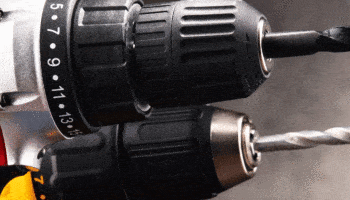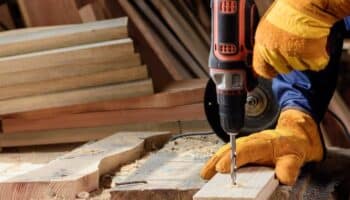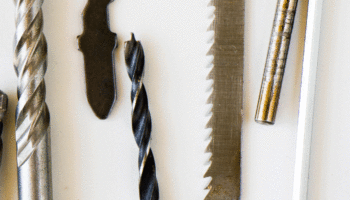We've independently reviewed this article to make sure it's as accurate as we can make it.
To find out more about our article creation and review process, check out our editorial guidelines.
Are you having a hard time comparing 3/8″ vs 1/2″ drill chucks?
Don’t worry, you’re not alone. Choosing the right drill chuck can be a bit of a headache.
But the good news is that in this article, you’ll learn all about their differences, so you can relax knowing that you’re making an informed decision.
1/2″ drills can be slower and more expensive, but have more torque and are more durable, which makes them great for professional work and long projects. 3/8″ drills, on the other hand, are faster and more affordable, but have less torque and are less durable. They are great for DIY projects.
Take a look at the extended drill chuck guide below that will explain the two further!
3/8 vs 1/2 Drill Chucks
Drills are available in many sizes, and 1/2” and 3/8″ drill chucks are among the most popular options to buy. The measurement of 1/2” or 3/8″ refers to the size that the chuck that holds the bit in place.
If you are deciding between a 1/2” or a 3/8″ drill chuck for an upcoming job, take a look at the following comparison.
#1 Torque
Ok, so first things first. What is torque? Torque is the force that a drill makes to turn an object, in this case, the drill bit.
So how do these drills measure up in torque? 1/2” drills have more torque than 3/8” drills.
This means more torque (or force) is released from 1/2″ drills so that you can get the job done.
This is why 1/2” drills are normally used for tougher jobs with harder materials, while 3/8″ drills are used for lighter jobs that don’t require as much force.
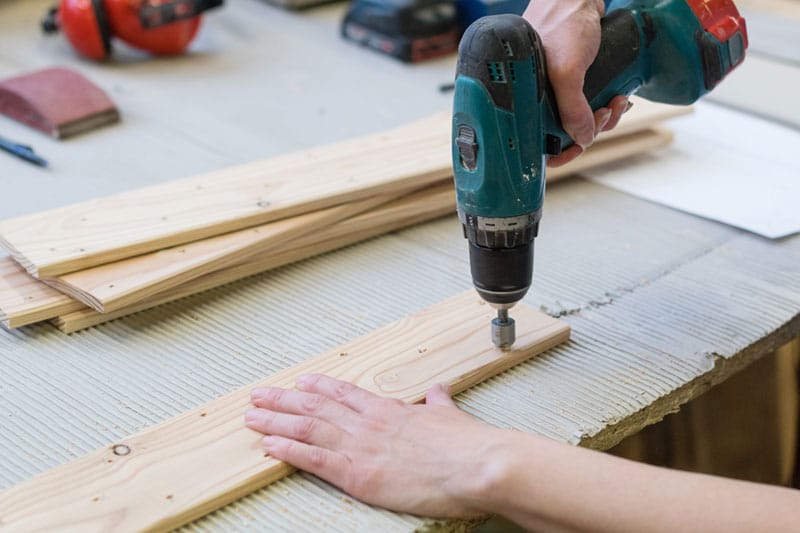
If you are choosing a drill bit based on torque alone, then a 1/2” drill is the best.
Keep in mind that you must use both drills with care. It’s important to note that a 1/2″ drill is more powerful than a 3/8″ drill, which means it can be more dangerous to operate.
#2 Speed
How fast will your drill bit spin? This all depends on how fast your drill is. So which is speedier? A 1/2” or a 3/8”?
It may surprise you, but a 1/2” is actually slower than a 3/8” drill because 1/2″ bits have to travel a further distance than their 3/8″ counterparts to complete one revolution.
This directly translates into less leverage for the 1/2″ bit, so it needs more power to turn.
#3 Durability
The durability of a drill depends on many factors, such as the quality of manufacturing, maintenance, usage, and materials.
However, the more powerful the drill, the more durable it can be.
As we saw earlier, a 1/2” drill has more torque and is, therefore, more powerful. This can make them more durable than 3/8″ drills.
But remember, multiple factors can affect the durability of a drill. You shouldn’t only focus on its power.
#4 Price
Here’s another really important factor to investigate before choosing drills and drill bits. That is, how much it is all going to cost.
When comparing ½” drills with ⅜”, there isn’t a lot of difference in the price. Generally speaking, ½” are more expensive.
But you do also have to take into account where you buy your drill from and what kind of drill you buy.
#5 Job Type
Now, let’s compare the kind of jobs you can do with each drill.
A 1/2” drill bit is best for the following:
- Professional work. You can complete any heavy-duty construction work with this drill. You can use 3/8” drill bits in a 1/2” drill giving you the freedom to chop and change.
- Prolonged use. This drill is best for jobs that you will do for long periods of time. This is because you will have more torque for the job, which will lighten your load.
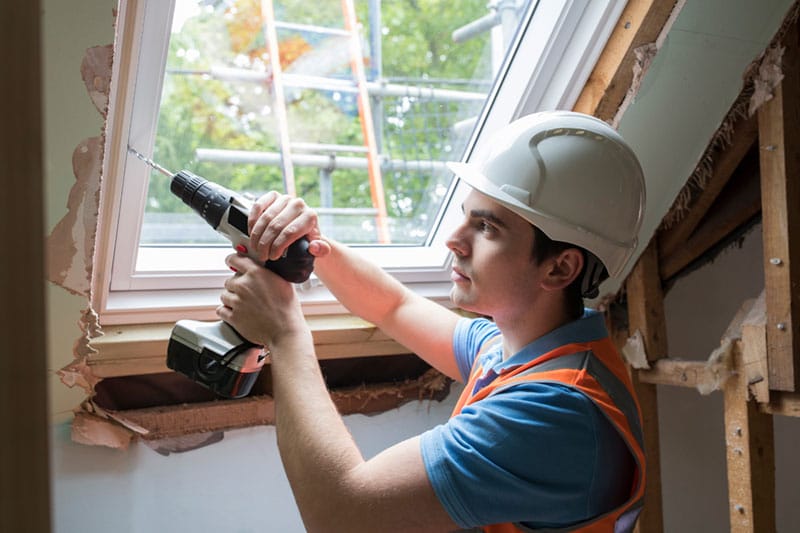
Which kinds of jobs can you use a 3/8” for? Take a look at the following list of jobs that fit best with this kind of drill and drill bit.
- Household DIY jobs. A 3/8” drill or drill bit is great for odd jobs around the house. These jobs are not too tough for you to need a stronger drill.
- Occasional jobs. A 3/8” drill is not as durable as a 1/2”. But if you are only using it occasionally for jobs around the home, it should more than fit the bill.
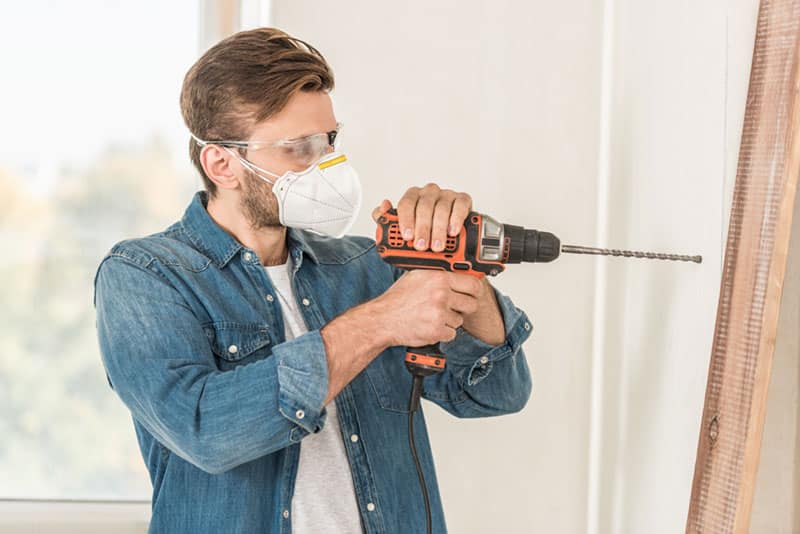
FAQ
If you still haven’t made up your mind yet about whether to choose a 1/2 vs a 3/8 drill, please check out this section. We’ll answer the most common questions to help you make an informed decision.
Can You Use a 3/8 Drill Bit in a 1/2 Inch Drill?
You can use a 3/8” drill bit in a 1/2” drill. This makes the 1/2” drill really versatile, as you can use it to accommodate different-sized jobs.
Drills with a 3/8” chuck, on the other hand, will only fit drill bits of up to 3/8″.
How Is a Drill Bit Fitted and Removed?
Fitting and removing a drill bit may seem a little complicated if you are doing it for the first time. Follow these simple instructions to complete the job.
1. Twist the black part of the chuck anti-clockwise to loosen it.
2. Insert the drill bit into the chuck.
3. Twist the black part of the chuck clockwise to tighten it. Continue twisting the chuck until the drill bit is firmly in place.
4. To remove the drill bit, twist the black part of the chuck anti-clockwise. Pull the drill bit out.
Do you fancy watching those steps? Then take a look at this tutorial video.
Conclusion
That about covers it! Here’s a quick summary of everything we’ve discussed so far:
| ½” Drills | ⅜” Drills |
|---|---|
| More torque | Less torque |
| Slower | Faster |
| More durable | Less durable |
| More expensive | Cheaper |
| Best for professional work and long projects | Best for household work and small projects |
You should use a ½” drill if:
- You need a drill with more torque
- You are looking for something very durable
- You want to use the drill for professional jobs
You should use a ⅜” drill if:
- You need a fast drill
- You are looking for something more economical
- You want to use the drill for DIY jobs around the home
Has this article been helpful to you? Then why not check out some of our other articles and free guides? You could even sign up to our email list.
Have a great day!
-Craig





